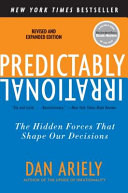

Dan Ariely explores how individuals often overestimate their ability to control outcomes in uncertain situations. This concept illustrates that people believe they can influence events that are actually random or beyond their control. This leads to irrational decision-making, as individuals may take unnecessary risks or make poor choices based on the false belief that they can manage the situation. Understanding this illusion can help individuals, especially in business and investment, to make more rational decisions by recognizing the limits of their control.
Continue readingAriely highlights how the concept of 'free' can significantly influence consumer behavior. People have a strong emotional response to free offers, often leading them to make irrational choices. For example, when faced with a choice between a free item and a discounted item, consumers will often choose the free option, even if it is of lesser value. This idea is crucial for marketers and entrepreneurs who can leverage the appeal of free offers to attract customers, but it also warns consumers to be mindful of their choices when 'free' is involved.
Continue readingThe anchoring effect refers to the cognitive bias where individuals rely heavily on the first piece of information they encounter when making decisions. Ariely demonstrates how initial numbers or prices can skew perceptions and influence subsequent judgments. This idea is particularly relevant in pricing strategies for businesses, as the initial price presented can anchor consumer expectations and willingness to pay. Understanding anchoring can help entrepreneurs and marketers craft better pricing strategies to maximize sales and profits.
Continue readingAriely discusses the distinction between social norms (which are based on relationships and community) and market norms (which are based on transactions and monetary value). He illustrates how mixing these two norms can lead to irrational behaviors, such as when people feel insulted by being offered money for a task that they would have willingly done for free. This concept is vital for leaders and managers who need to foster a positive workplace culture and understand how to motivate employees effectively without compromising social relationships.
Continue readingExpectations play a crucial role in shaping our experiences and perceptions. Ariely's experiments show that when people expect something to be good, they are more likely to perceive it positively, and vice versa. This idea emphasizes the importance of managing expectations in various fields, from product development to customer service. By setting realistic expectations, businesses can enhance customer satisfaction and improve overall experiences, leading to better outcomes in terms of loyalty and repeat business.
Continue readingThe decoy effect occurs when consumers are presented with a third option that is designed to make one of the other two options more attractive. Ariely explains how the presence of a less appealing choice can nudge consumers toward a desired option. This principle is particularly useful in marketing and product design, as it can influence purchasing decisions significantly. Understanding the decoy effect can help entrepreneurs and marketers design their offerings to guide consumer choices effectively.
Continue readingAriely emphasizes that emotions play a significant role in the decision-making process, often leading to irrational choices. He presents evidence that people make decisions based on their emotional states rather than logical reasoning. This understanding is essential for leaders and marketers, as it highlights the importance of emotional intelligence in business. By recognizing and addressing the emotional factors that influence decisions, businesses can create more effective strategies and improve customer engagement.
Continue readingThe reading time for Predictably Irrational depends on the reader's pace. However, this concise book summary covers the 7 key ideas from Predictably Irrational, allowing you to quickly understand the main concepts, insights, and practical applications in around 23 min.
Predictably Irrational is definitely worth reading. The book covers essential topics including The Illusion of Control, The Power of Free, Anchoring Effect, providing practical insights and actionable advice. Whether you read the full book or our concise summary, Predictably Irrational delivers valuable knowledge that can help you improve your understanding and apply these concepts in your personal or professional life.
Predictably Irrational was written by Dan Ariely.
If you enjoyed Predictably Irrational by Dan Ariely and want to explore similar topics or deepen your understanding, we highly recommend these related book summaries:
These books cover related themes, complementary concepts, and will help you build upon the knowledge gained from Predictably Irrational. Each of these summaries provides concise insights that can further enhance your understanding and practical application of the ideas presented in Predictably Irrational.